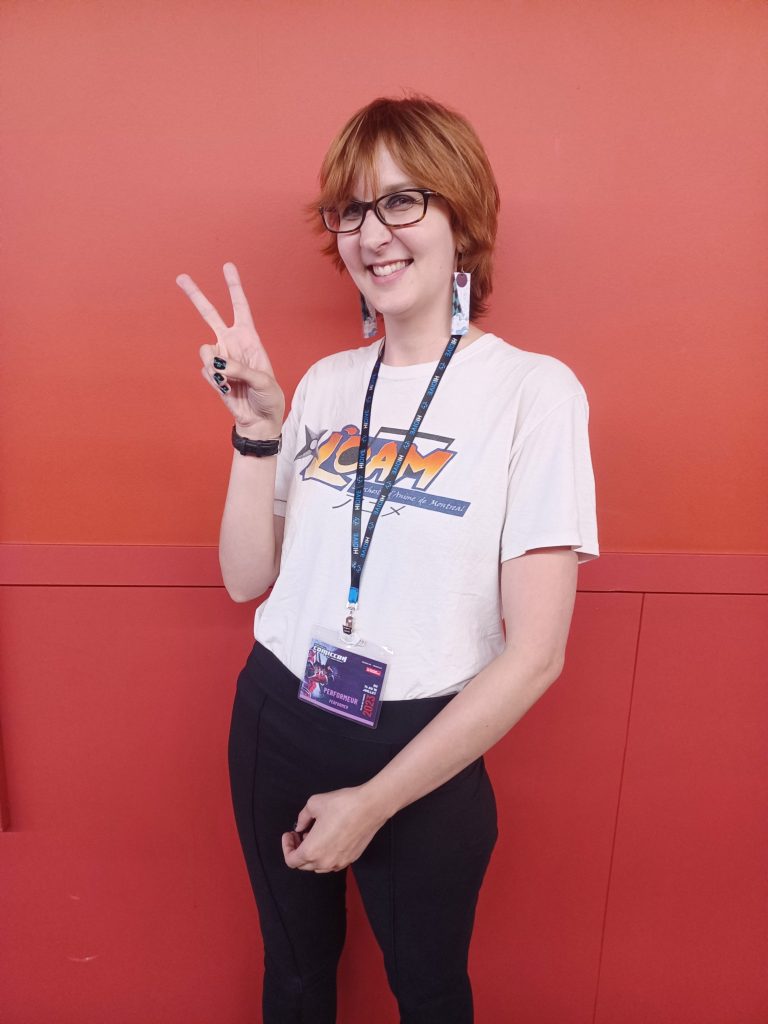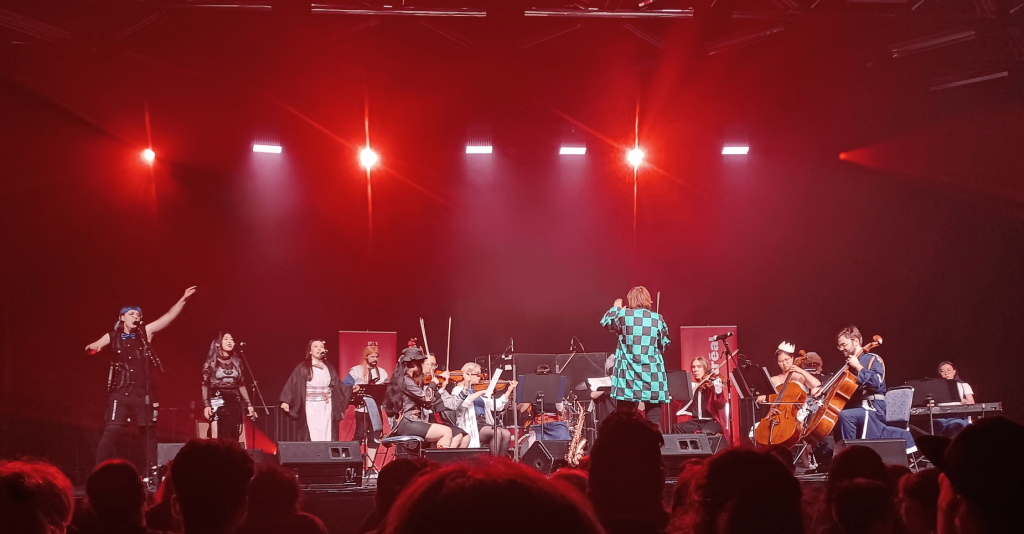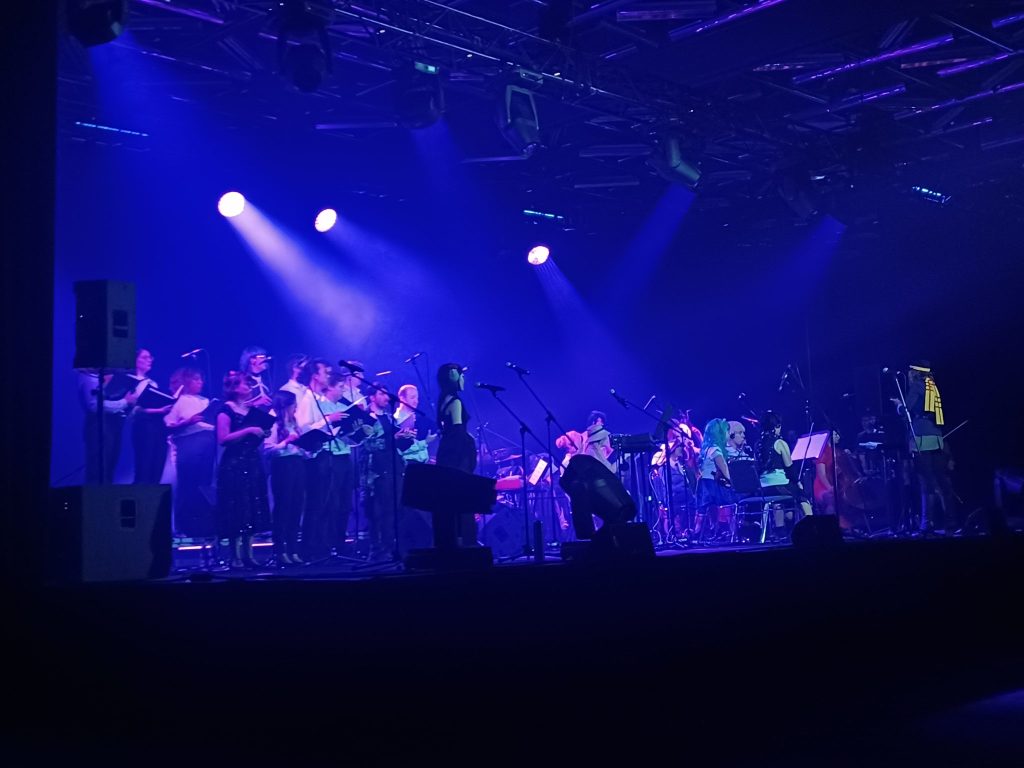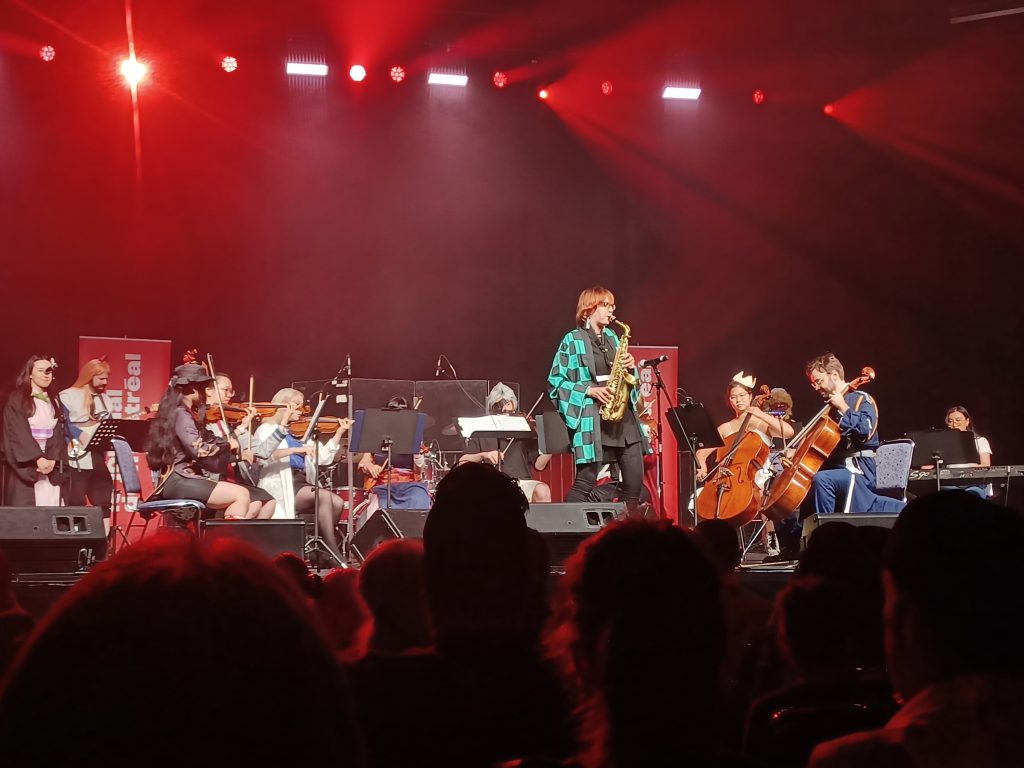This ComicCon, I got the chance to sit down with Melissa Tardif, the conductor and founder of the Orchestre d’Anime de Montréal (OAM). After experiencing their orchestra for the first time at Otakuthon last year, I was interested in talking to Melissa about the orchestra, her inspirations, and how they fit into the local anime community.

ImaginAtlas: What inspired you to create the OAM?
Melissa Tardif: It was the lack of orchestras that catered to Japanese pop music. There are a lot of small rock bands and other anime and j-pop inspired groups but nothing that incorporates strings, vocals, and a full band. There are also wind orchestras that perform a lot of video game music, but I wanted something that was geared [toward] anime lovers like me. We didn’t have anything similar in Montreal, so I wanted to bring it to life.
How many members were there at the start? How did you recruit people?
Melissa: I have two degrees in music; my bachelor’s is in music education, and my master’s is in orchestral conducting. In the music faculty, there are many people who are geeky and have a lot of talent, so I met a lot of cool friends. I wanted to give them the opportunity to perform. I have always wanted to direct my own orchestra, so I was like: why not make a small orchestra and geek out with a bunch of fellow musicians? We started off with 14 or 15 people; now, we have grown to 18. Last year at Otakuthon, we had a choir onstage and were 35 people in total, but this year we are back to the core orchestra, with a few more strings than before.
When did you first start coming to Otakuthon and ComicCon?
Melissa: I started arranging music in a little choir that had done performances at the opening and closing ceremony of the Otakuthon in 2015 or 2016. Since then, the OAM performed in-person at the Otakuthon in 2019 and in 2022. This is our first year at ComicCon, so it is very exciting.
What were your major orchestral inspirations?
Melissa: It was the Orchestre à Vents de Musiques de Films and the Orchestre de Jeux Vidéo, both local groups. I’ve learned a lot from their concerts, I loved the idea, and I love when people dress up to go to these concerts. I knew right away that I wanted to give that experience to Quebec anime fans. The Otakuthon brings thousands; I think they had thirty thousand guests last year. It was an amazing turnout, so there definitely is a hunger for this kind of music. I want to provide the feast for the attendees who like this genre.
Is the OAM all volunteers? What kind of skills are required to join?
Melissa: It’s all volunteers with diverse levels of experience. I have some professional musicians who play gigs around Montreal, like the JazzFest, I have some musicians who studied music in school for years and wanted to continue playing on the side of 9 to 5 careers, and I have some members for whom the OAM is their first ensemble. We have a big eclectic mix in the group level-wise, but we are all enthusiastic and very close, and we are able to work well together.
What is the biggest challenge of the OAM?
Melissa: As people often complain with Dungeons & Dragons, the biggest obstacle is [coordinating enough time to play]. It is very challenging to find a time when 18 people are all free to rehearse. But overall, we totally make it work, and it is our passion that helps us through that.

You mentioned you got an MA in conducting. Have you conducted other orchestras? What was that experience like compared to the OAM?
Melissa: The OAM is definitely different. I come from a diverse background; I played jazz—my main instrument is saxophone—pop, and I also had an interest in classical and symphonic scores. I was really intrigued by the different styles I was learning over the years, and I wanted to start something that would work with all those styles together. For my master’s, I directed the McGill wind orchestra, which focuses on classical work. While I enjoyed McGill, I wanted to form a group that included all of my favourite genres.
What was your favourite piece to conduct?
Melissa: Last year, it was an arrangement from one of my favourite composers and my favourite series of all time, a piece from Made in Abyss, “Tozo Hanoline”. It’s a great piece to perform, and I would love to do it again if we have another choir.
The OAM plays a lot of medleys and songs that cross genres. What is the process of putting these together?
Melissa: The spice of the group is that we don’t just make a cover; we perform a very “us” version of songs. Sometimes, that means taking pieces meant for a rock band and singer and incorporating strings and wind instruments. Back when we started, I was doing all the arrangements alone and home-brewing everything for the group. Now, I have a team of arrangers. Everyone participates. It is a big part of being in the group; we play what we write and arrange. I often listen and transcribe a melody, then begin modifying it.
I was at your show at the last Otakuthon and was quite impressed by the choir. Have you worked with choirs before, and would you do it again?
Melissa: I would definitely do it again, absolutely. It was a big feat, mostly for setup. Some COVID restrictions meant we couldn’t quite do what we wanted staff-wise, but it is definitely something I would like to try again. In the next few years, I am more interested in doing tribute-based and themed concerts rather than just an eclectic mix. This Otakuthon, we are doing classic vs modern themes for anime fans. For ComicCon, we did our classic pieces, and for our next concert, I want to do things like the music of Naruto and other specific shows.

At what point did cosplay come into the OAM?
Melissa: I knew I wanted to do it right away. At the first OJV concert that I saw years ago, there were a few members cosplaying, and I loved it. When I started working with the Otakuthon, I thought it would be so cool if we incorporated cosplay as well. A few people were quite eager, and even the people who were shy at first got into it. One member wasn’t a huge fan of cosplay, but he got into 3D printing and started making massive masks; he was the looming Magus at last year’s show. So he caught the cosplay bug that “infested” the group too.
How do you put together a stage show at a big venue like ComicCon?
Melissa: We are at the mercy of the sound guys—we put a lot of faith in them. We are having a great time at ComicCon so far. We had our first sound check just now. I explain my vision to them, and they help us execute it. I plan for what is current, what is popular, what will work for the general crowd; but I also try to sneak in Indie pieces that people may not know offhand, and hopefully they will listen and discover the piece afterwards.
Did the pandemic have an impact on the orchestra? Did you learn things you could take away from the restrictions?
Melissa: Yes and no. A lot of what we do is “let’s huddle up and make music together,” and we only just got out of the woods to perform live again. We did a lot of virtual performances, and we may do more at some point, but now we want to get back into live shows.

What was your most memorable convention experience thus far, good or bad?
Melissa: Knock on wood, this convention! It has been amazing, they treated us so well, and we were so excited to perform. I think the pandemic affected a lot of conventions and organizations; some stuff, like the volunteer numbers, have suffered a lot. But we always want to persevere and share our love of music no matter what the situation may be. When it rains, it pours, but we will still be playing outside—except for the rain from yesterday.
Do you have any projects or albums in the works?
Melissa: We have a few upcoming concerts. We are confirmed to be at Otakuthon in August. In terms of albums, we are on an album rest. We did a lot of production during the pandemic when activities like the Otakuthon were paused. We have three albums, two full-length and one miniature album/4 track EP, out on Spotify and other platforms. For now we want to do some music video projects, and expand from performing at conventions in Quebec to the Ottawa and Gatineau area as well.
Like many of the people leading groups at ComicCon, Melissa Tardif is a hardworking, multitalented volunteer eager to share her passion with others. She has worked hard to get the OAM off the ground and create a team of people as dedicated as she is. The OAM’s cross-genre shows, which reference a smorgasbord of anime, are a feast for the eyes and ears, and I look forward to seeing what the OAM will do with shows driven by more specific themes. One thing is for sure, anyone in the Montreal geek scene should keep an eye on this group!
